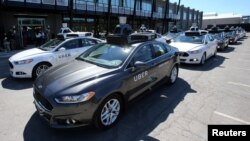Freewill
Platinum Member
- Oct 26, 2011
- 31,158
- 5,072
- 1,130
By what I see driving it might be a good trade off if we also lose road rage and drivers who are very unthinking or just "I got to be first" aholes.
I just wonder how this will go over with those who dirve 15 miles per hour over the speed limit. I assume driverless cars will obey the speed limits.
Fears that road etiquette could be lost with introduction of driverless cars - AOL News UK
Three in four drivers are worried that the introduction of driverless cars will spell the end of road etiquette, research shows.
The survey by uSwitch.com found that 75% of motorists fear the new technology will be incapable of good manners on the road, with some concerned this may even lead to accidents and delays.
Flashing lights, moving aside for emergency vehicles and letting other cars out of side streets, were named as the key gestures people feel will be forgotten as the new cars take to the roads.
More than a quarter of participants were also concerned that driverless cars will be less likely to be considerate to pedestrians or use the horn to alert other drivers to situations coming up ahead
But while research shows that 90% of traffic accidents are caused by human error, four in 10 were also concerned that car insurance premiums will rise if driverless cars become more common in the UK.
I just wonder how this will go over with those who dirve 15 miles per hour over the speed limit. I assume driverless cars will obey the speed limits.
Fears that road etiquette could be lost with introduction of driverless cars - AOL News UK
Three in four drivers are worried that the introduction of driverless cars will spell the end of road etiquette, research shows.
The survey by uSwitch.com found that 75% of motorists fear the new technology will be incapable of good manners on the road, with some concerned this may even lead to accidents and delays.
Flashing lights, moving aside for emergency vehicles and letting other cars out of side streets, were named as the key gestures people feel will be forgotten as the new cars take to the roads.
More than a quarter of participants were also concerned that driverless cars will be less likely to be considerate to pedestrians or use the horn to alert other drivers to situations coming up ahead
But while research shows that 90% of traffic accidents are caused by human error, four in 10 were also concerned that car insurance premiums will rise if driverless cars become more common in the UK.

